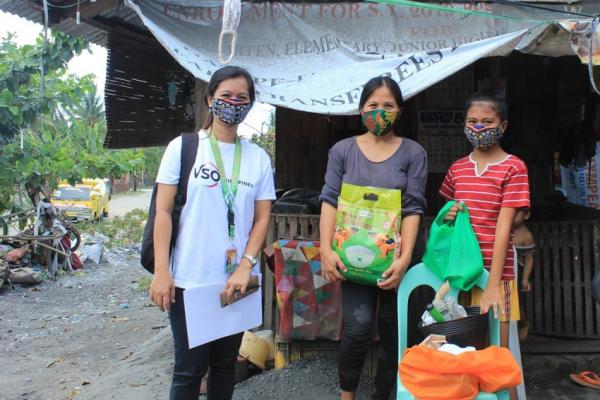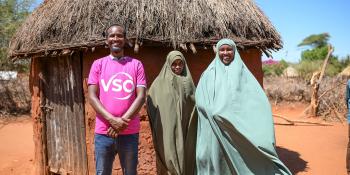People supported by VSO showed marked resilience through the pandemic but have emerged with changed priorities. A survey covering nine countries reveals farmers and business owners urgently need support with innovation and training to help them rebuild their incomes.
It has become clear that whilst COVID-19 remains a global health crisis, it has also become a severe economic emergency for many across the world. In a number of Asian and African countries, death rates have remained relatively low; however, the preventative lockdowns enforced by governments have led to severe economic consequences for the poorest and most marginalised.

Even in countries where full lockdowns were not enforced, factors such as recessions, volatility and rise of global food prices are leading to widespread economic impacts. From affecting job prospects for young people around the world, to the reduced level of funding now available for international development programmes, we wanted to understand just how people are being affected amid the coronavirus pandemic.
In order to gain a better understanding of how people were being economically affected, we surveyed 3,445 people across nine countries in Asia and Africa to gain an insight into how they were keeping afloat during the pandemic. The vast majority of those who were surveyed (87%) are currently being supported by VSO - what we term our 'primary actors'.
What they told us
What's clear is that for the majority of our primary actors, COVID-19 has been primarily an economic crisis. Of the people we spoke to, 82% said they had faced at least moderate challenges due to a lack of cash flow, whereas only 37% had faced the same degree of health challenges.
Due to factors such as travel restrictions and difficulty accessing markets, 800 survey participants were forced to borrow money from friends of family, with a similar number having no choice but to reduce the daily food intake for themselves and their families.
Tabitha's story: Facing financial difficulties in Nigeria
Tabitha Dali, 31, is just one of the 690 business owners who said they would need a longer period of time and financial support in order to get their businesses going again.
All the savings I had from the business were spent on food and I am finding it difficult to provide for my family.Tabitha Dali
"I participated in a VSO programme in Yola, Nigeria. I learned how to make pastries and about food production in 2018, then was able to start my own business." said Tabitha.
"Due to the outbreak of COVID-19, I have unable to continue my business due to the restriction of movement. It has affected my livelihood, all the savings I had from the business were spent on food and I am finding it difficult to provide for my family." Tabitha added.
Building financial resilience
Our programmes are designed to encourage the people we work with to build up their financial resilience. We do this by emphasising the importance of savings, improving access to networks, and providing training in the skills to diversify people's income. This has shown to be largely successful and half of our primary actors, such as Tabitha, are able to rely on their savings during the economic downturn.
Whilst this is a welcome safety net for many, the economic impacts of COVID-19 are widespread and the knock-on effects could continue for some time, leaving many in precarious financial situations.
Sathi's story: From financial independence, to borrowing money to stay afloat
Before the pandemic hit Bangladesh, Sathi Das was earning her own money and was able to contribute to her children's school fees.
After taking part in VSO's women-only crab fishing training, Sathi was economically empowered and gained respect from her husband and the wider community.
However, since March the lucrative international markets closed and the price of crab plunged by 80%, to just £1.80 per kilo. For Sathi, this meant her income had dropped and she was forced to sell all of her assets to keep her family going.
“My husband’s business is also struggling and we’re now both unable to put food on the table. We borrow money from our neighbours – I’m not sure when and how we’re going to be able to pay off our debts. It’s a very uncertain and challenging time for us. I hope that we can start our crab business again soon and be able to return to how things were before the pandemic,” said Sathi.
Sathi is not alone in her financial difficulties. She is among 69% of our respondents from Bangladesh who said they were forced to sell livestock or jewellery to meet financial obligations.
Resilience amid COVID-19
Supporting people across the world during this difficult time is vital. Unlike richer countries, which have developed safety nets, fewer than four in ten of VSO's primary actors were unable to receive any government support whatsoever.
In order to develop economic resilience and diversify income-generating activities, 70% of the 3,445 people VSO spoke to have said they have changed their priorities and hope to learn new skills for more financially secure futures.
COVID-19 has been a stark demonstration of the importance of being adaptable and resilient in the face of shocks and upheaval. Many of our primary actors are struggling for survival; however, the necessity of having diverse ways of making an income to increase personal and household resilience has become clearer than ever.
There is a huge opportunity here to shape policy to create more accessible and inclusive social safety nets for the most vulnerable people. We are pivoting programming based on the results of what our primary actors have told us, and we will be surveying them again to measure whether our adapted implementations are helping them through the challenges.
VSO’s Livelihoods Project Manager, Billie Wilcox-Brooke, explains how we're adapting our programmes to support those in vulnerable situations:
“The rapid assessment survey demonstrated that financial issues are currently the biggest challenge for most primary actors we work with," explained Billie.
"The first phase of VSO’s programmatic response to the pandemic supported primary actors with initial measures to help maintain their livelihoods by adopting coronavirus-safe practices and adapting to meet market demand by producing masks, soap and hand sanitiser. Based on the findings and priorities highlighted by primary actors in the survey, our programmes are now going further in their focus on better access to finance, skills development and income diversification," said Billie.
Find out more about our resilient livelihoods work
Discover how we're supporting people to adapt during COVID-19, and prepare for an uncertain future.
Read more

A ripple of change: how VSO volunteers are transforming communities
Every act of volunteering begins with a choice — a decision to act out of a desire to make a difference. Across the world, VSO volunteers are proving that one spark of action can ignite something much bigger.

The two volunteers empowering girls and young women in Mozambique
Nelma and Carmirene and are two volunteers working on VSO's EAGLE project in Mozambique. For Nelma and Carmirene, education is not just about school, it is about meeting people where they are and using the right tools to challenging harmful norms. Here are their stories.
Opening doors to safety, education, and a brighter future
For girls in Karamoja, the poorest region in Uganda, being forced into early motherhood is all too common. This Christmas, you can open the doors to Safety, Education, and a Brighter Future.
